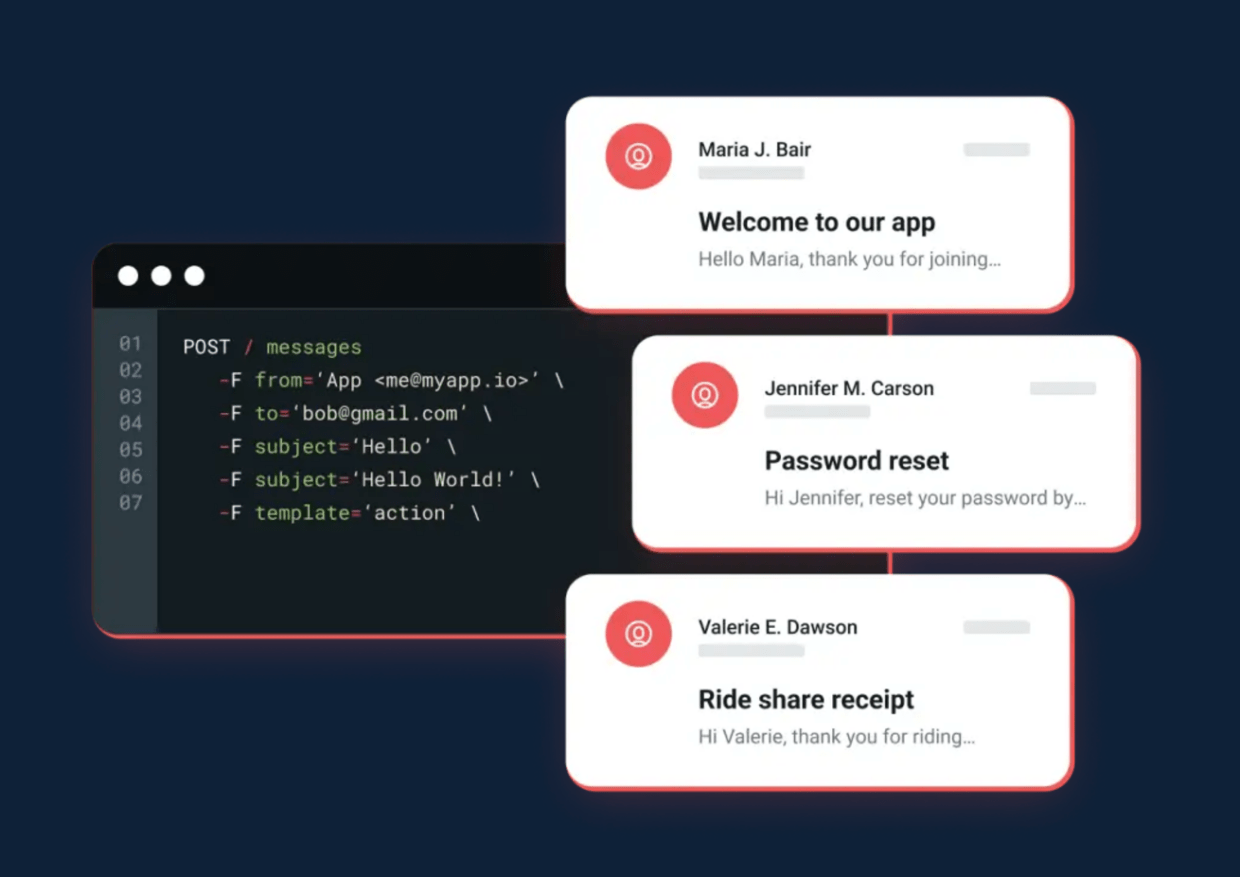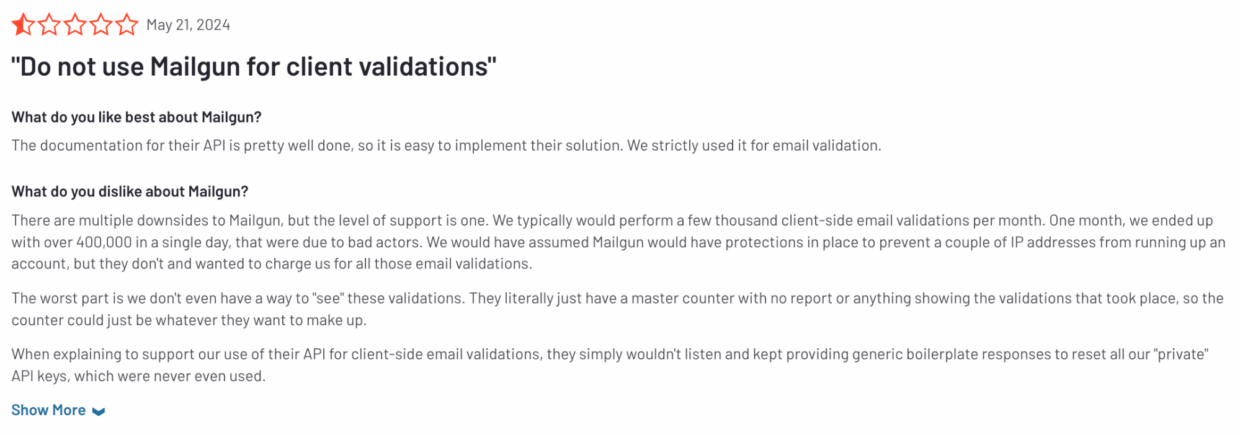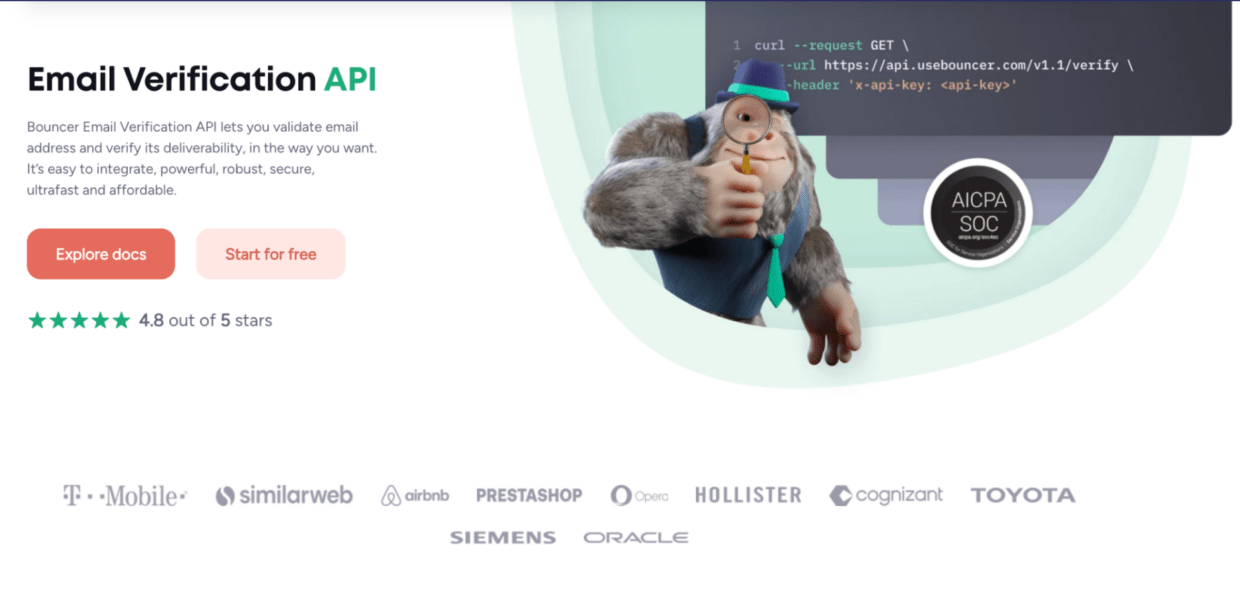However, critical evaluation is essential as Mailgun’s capabilities, from api calls referenced to email authentication, may not suit every need.
For those seeking advanced reliability and streamlined features, Bouncer API offers a compelling alternative. Dive into this blog to explore the strengths, limitations, and key comparisons between Mailgun and Bouncer to make the best decision for your email delivery workflows.
Overview of Mailgun API
The Mailgun API serves as a powerful tool for developers integrating email delivery, email sending, and email validation into their applications.

Its robust architecture allows seamless management of domains, inbound messages, and mailing lists, making it a preferred choice for businesses seeking reliable email functionality.
Key features of Mailgun API include:
- HTTP API calls for managing email operations, including post calls to send emails and track data.
- Authentication using HTTP Basic Auth, with the sending API key passed through the authorization header.
- Support for most programming languages, with flexible JSON responses for streamlined integration.
- Developer-friendly CRUD operations, enabling users to create, update, or delete resources such as domains, messages, and mailing lists.
- Advanced tools to handle multiple recipients, strings encoded, and ensure the correct offset in numerical parameters.
Strengths of Mailgun API
Comprehensive Documentation
Mailgun’s documentation start offers detailed guidance, simplifying implementation for developers of all experience levels. From basic setups to advanced parameters, its instructions are thorough and accessible.
Developer-Friendly Tools
- Built-in JSON responses for managing dynamic requests.
- Support for tags, click tracking, and attachments, making it versatile for various use cases.
- Tools to handle complex scenarios like managing ip addresses or configuring a new domain.
Broad Functionality
Mailgun is designed to support diverse needs, from bulk email sending to personalized messaging. Features like multiple recipients, SMTP support, and post calls allow developers to adapt the API to different workflows.
Compliance and Security
Meeting GDPR, HIPAA, and ISO 27001 standards, Mailgun ensures secure operations for every mailgun account. Its compliance with global standards makes it a trusted choice for businesses managing sensitive data.
Common Use Cases
Mailgun API is widely used for:
- Tracking messages and delivery statuses using http response codes and tags.
- Managing ip addresses and configuring operations for a single domain.
- Processing requests with dynamic content via javascript or other supported systems.
Mailgun’s combination of flexibility, documentation, and compliance makes it a strong contender for developers aiming to deliver effective email solutions. However, understanding its ambiguous nature in certain setups and addressing specific challenges requires careful evaluation.
Limitations and Challenges of Mailgun API
While the Mailgun API offers robust functionality for email sending, email validation, and tracking messages, users frequently report notable challenges that could impact its usability and reliability.

Below, we examine these challenges, supported by customer feedback.
1. Support Team Issues
One recurring complaint revolves around Mailgun’s support team, which users describe as unresponsive or providing generic, unhelpful responses. For example, a reviewer noted that attempts to address unexplained spikes in API calls were met with boilerplate instructions to reset unused API keys rather than proactive solutions.
These delays are particularly problematic during high-volume operations or system errors, leaving customers feeling unsupported in critical moments.
2. Ambiguous Nature of Data
Mailgun’s JSON responses and tracking messages sometimes lack clarity, making debugging and analysis difficult for developers. This „black box“ experience has been a source of frustration for users who need detailed insights into email validation activity or HTTP response codes.

For instance, one customer mentioned the inability to access reports or counters showing validation numbers, creating uncertainty about their actual usage and costs.
3. Complexity for Beginners
The Mailgun API’s flexibility can make it overwhelming for less-experienced developers. Tasks such as ensuring the correct offset in post calls, handling strings encoded, and managing multiple recipients can quickly become challenging. Additionally, the process for setting up a new domain or integrating email authentication often requires deeper technical expertise, which may not be ideal for smaller teams or startups.
4. Technical Issues
Mailgun’s technical reliability has also come into question. Reviews highlight incidents such as 301 redirection errors during API calls, which led to failed email deliveries. Another user reported losing 60% of transactional emails due to a malfunction, which the support team failed to address promptly.

Issues with new domains, inconsistent HTTP response codes, and delays in handling email authentication further complicate its usability.
5. Pricing Concerns
Mailgun’s pricing structure, while scalable, becomes expensive for businesses with high-volume API calls or additional requirements like support for a single domain. Customers have also criticized the lack of cost control measures, such as safeguards against spikes caused by malicious IP addresses. As one reviewer pointed out, Mailgun charged for over 400,000 email validations triggered by bad actors, with no protective mechanisms in place.

Bouncer API: A Robust Alternative
When comparing email APIs, Bouncer API emerges as a highly reliable and developer-friendly option.

It not only addresses the challenges posed by solutions like Mailgun but also enhances functionality, scalability, and transparency, making it a strong alternative for businesses seeking precision and efficiency.
Ease of Integration
One of Bouncer’s standout features is its seamless integration process. With clear and well-structured documentation, developers can easily onboard the API across all programming languages, reducing the time spent troubleshooting. Its robust design ensures that functions like verifying links, handling numerical offset, and managing built-in date type fields are efficiently implemented. The intuitive use of base URL simplifies the process for developers to work with resources and perform critical API actions such as processing validations or accessing detailed reports.
Bouncer’s flexibility accommodates both technical and non-technical teams. Even with minimal experience, developers can have the API ready to validate mailing lists in just a few hours.
Advanced Validation Capabilities
Bouncer takes email validation to a new level, addressing key pain points like detecting disposable emails, deep-verifying catch-all addresses, and ensuring that free domains are accurately flagged. Its system dynamically identifies invalid or risky email types, preventing users from registering with throwaway addresses.
For businesses handling large volumes, Bouncer’s validation engine processes both real-time and bulk requests seamlessly, offering detailed feedback. Results are generated with a focus on accuracy, minimizing unknowns or false-positive results. These advanced features ensure that only high-quality email addresses enter your systems, protecting your business reputation.
Scalable Solutions
Bouncer is built to grow with your business. Its ability to handle both real-time checks and bulk validations makes it ideal for organizations of any size. Whether you need to validate hundreds of email addresses at once or manage registrations one by one, Bouncer’s system scales effortlessly. The robust API handles high-throughput operations while maintaining exceptional reliability, helping your team stay ahead of demand.
With real-time safeguards, like verifying the sending key for individual requests, Bouncer ensures secure transactions, whether you’re working with a client interface or directly via the API. This flexibility allows for easy customization of workflows to suit diverse use cases.
Transparent and Affordable Pricing
Bouncer prides itself on offering clear, predictable pricing that works for businesses of any size. Unlike some competitors, there are no hidden costs or surprise overages. For smaller businesses, this means managing email validation budgets without concern for unexpected expenses. For enterprises, the scalability ensures you only pay for what you use, without being locked into rigid plans.
Enhanced Security
In today’s threat landscape, protecting sensitive systems is critical. Bouncer has implemented industry-best practices to ensure robust security:
- API key protection and encrypted transactions secure every validation request.
- Safeguards against misuse, such as limiting access by username or specific requests, reduce risks.
- Customizable policies allow businesses to control how and where data is processed, ensuring compliance with privacy regulations.
Choose Bouncer API
By combining simplified integration, advanced validation features, scalability, transparent pricing, and enhanced security, Bouncer API stands out as a top alternative to competitors like Mailgun. Whether you’re a startup managing customer registrations or an enterprise validating millions of addresses, Bouncer ensures your email workflows are reliable, efficient, and protected. With support for modern development practices and adaptable features, it’s a solution that grows with your business while delivering consistent results.
Sign up for Bouncer for free today!



